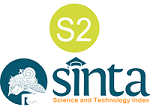PENGEMBANGAN MODEL MATEMATIKA JARINGAN SUPPLY CHAIN DENGAN MEMPERTIMBANGKAN EMISI PADA INDUSTRI DAUR ULANG KERTAS
Asgar Ali(1), Nur Aini Masruroh(2*)
(1)
(2) Program Studi Teknik Industri Fakultas Teknik, Universitas Gadjah Mada
(*) Corresponding Author
Abstract
Recycling is part of the green supply chain management which is developed base on the concept of environmentally friendly industry to respond the various issues regarding the environmental problems of the world. Distribution of recycled products starts from consumers and ends to manufacturing. The objective is to limit the waste in order to save energy and prevent the dumping of hazardous materials into the environment. However there are complexities in the supply chain because of some uncertainties such as the return of recycled product and the environmental impact resulting from the operation of supply chain. In this research, linear programming optimization method is proposed to overcome that problem with maximizing profit is set as the objective function. Emissions resulting from the recycling process are considered in the model. These results indicate that the mathematical model provides profit of Rp. 37.909.659, with 1.137.760 grams of CO2 emissions from the production process, 38.473,4 grams of CO and 5.884,9 grams HC + NOX of transport. While the proposed strategy is use the right vehicles and select the most efficient route according to the paper collected from consumers and sold to manufacturing. For the production process, it is required to add 3 pressing machines and 1 chopped machine, so the capacity of the working hours of 384 hours per month can be increased to 960 hours per month.
Keywords
Full Text:
PDFReferences
Chaabane, A., Ramudhin, A., and Paquet, M., 2012, “Design of Sustainable Supply Chains Under the Emission Trading Scheme”, Journal of Production Economics, 135, 37-49.
Hickford, A.J., and Cherrett, T.J., 2007, Green Logistics: Developing Innovative and More Sustainable Approaches to Reverse Logistics and the Collection, Recycling and Disposal of Waste Products from Urban Centres, Transportation Research Group, University of Southampton.
Hillier and Lieberman, 2005, Introduction Operations Research 8th Edition, Andi, Yogyakarta.
Ninlawan, C., Seksan, P., Tossapol, K., and Pilada, W., 2010, “The Implementation of Green Supply Chain Management Practices in Electronics Industry”, Proceeding of the International Multi Converence of Engineers and Computer Scientists, Vol 3.
Sheu, J.B., 2008, “Green Supply Chain Management, Reverse Logistics and Nuclear Power Generation”, Journal of Transportation Research, 44, 19-46.
Srivastava, S.K., 2007, “Green Supply-Chain Management: A State-Of-The-Art Literature Review”, International Journal of Management Reviews, 9, 53-80.
Tsai, W.H., and Hung, S.J., 2009, “Treatment and Recycling System Optimisation With Activity-Based Costing in Weee Reverse Logistics Management: An Environmental Supply Chain Perspective”, International Journal of Production Research, 47, 5391–5420.
Article Metrics
Refbacks
- There are currently no refbacks.
Copyright (c) 2017 asgar ali, nur aini masruroh

This work is licensed under a Creative Commons Attribution-ShareAlike 4.0 International License.
Copyright © 2024 Jurnal Teknosains Submit an Article Tracking Your Submission
Editorial Policies Publishing System Copyright Notice Site Map Journal History Visitor Statistics Abstracting & Indexing










